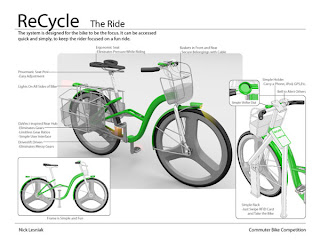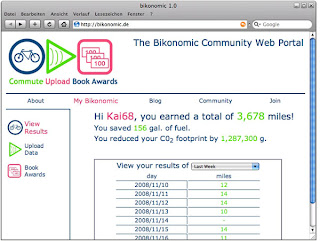 When I announced the winner of the commuter bike design competition, I mentioned that we had a few differing opinions on the jury. Those differences led to great discussions, which were the highlight of staging this competition for me personally. One juror in particular felt pretty strongly that a non-cyclist would not give up his or her car because of just the bike itself. I can’t say I disagree with that at all, but for the purposes of the competition, we chose to focus more on the design of the bicycle than to address all the other factors. A few of the entries took the bigger “lifestyle” picture into consideration though, so I want to share a couple of those now.
When I announced the winner of the commuter bike design competition, I mentioned that we had a few differing opinions on the jury. Those differences led to great discussions, which were the highlight of staging this competition for me personally. One juror in particular felt pretty strongly that a non-cyclist would not give up his or her car because of just the bike itself. I can’t say I disagree with that at all, but for the purposes of the competition, we chose to focus more on the design of the bicycle than to address all the other factors. A few of the entries took the bigger “lifestyle” picture into consideration though, so I want to share a couple of those now.
ReCycle was a bike sharing based concept by Nick Lesniak. I am sure that most of you are familiar with bike share programs in different parts of the world, but the social aspect of Nick’s concept is what we found interesting. Agnete (who happens to be the juror I just mentioned) listed ReCycle as her top pick and had this to say about it in her initial comment:
 I was curious to see if anyone would take a more holistic approach to the problem, and this is the only entry that actually looked at the bigger story around the bike. The concept of a bike share program is not a new invention, but what I really like is the Café – the social aspect of it! It offers a bike community to someone that is not a hardcore biker-dude! It’s about the PEOPLE you meet, it becomes a social meeting place, and that would encourage a person to ride more. It’s sort of similar to the rollerblade rental shops you have in Santa Monica – it’s a hang-out place too. And the store doesn’t sell or fix bikes, it offers other stuff that average people may have more interest in. And the contestant also designed a bike – which is not earth shattering exciting, but it is a good basic bike for all ages and abilities, with the right accessories, “comfort” and very approachable.
I was curious to see if anyone would take a more holistic approach to the problem, and this is the only entry that actually looked at the bigger story around the bike. The concept of a bike share program is not a new invention, but what I really like is the Café – the social aspect of it! It offers a bike community to someone that is not a hardcore biker-dude! It’s about the PEOPLE you meet, it becomes a social meeting place, and that would encourage a person to ride more. It’s sort of similar to the rollerblade rental shops you have in Santa Monica – it’s a hang-out place too. And the store doesn’t sell or fix bikes, it offers other stuff that average people may have more interest in. And the contestant also designed a bike – which is not earth shattering exciting, but it is a good basic bike for all ages and abilities, with the right accessories, “comfort” and very approachable.
The social motivation factor makes me think about the Strida bike as it has it’s own community, Strida Café (I believe this is an online community only?). Mark – you write about it in your guest post – and I think you are very right about why your bike is such a success among ‘non-bikers’ – it’s the social and fun, non-sporting nature of both the bike and the community!
I think she summed up pretty well what is appealing about this concept. I had ReCycle on my top ten list as well, but I ranked it considerably lower because I was more focused on the design of the bike for this particular competition. Still, I like the idea and I certainly think it is worthy of special mention in this post. Here is what Nick had to say to describe his own concept:
In order to convert the most amount of people to using a bike, I have opted to go with a bike share program, ReCycle. This service would allow people to try biking without having to purchasing one. Also these programs are successful in Europe, so what would it take for it to be successful here? A culture wear biking isn‘t looked at as a lower class method of transit. Using the community bike as a brand and developing it further into a place to go, something to wear, and a community hub, it soon becomes a sub-culture. People who are looking to help our world and want to be an active part in our communities, the ReCycle becomes the center for local meetings. Soon the ReCyle is just a method of getting around the city to do community service. But ReCycle is the seed from which all this new environmental community consciousness blossomed from.
 Another entry that took a different approach was “Bikonomic” by Kai Huppmann. Kai took an approach that people need an “additional incentive to change” and came up with a system to reward people for the trips that they chose to make by bike. The execution of this idea wasn’t as good as some of the other entries, but the idea is quite interesting. I will let Kai explain the concept in his own words:
Another entry that took a different approach was “Bikonomic” by Kai Huppmann. Kai took an approach that people need an “additional incentive to change” and came up with a system to reward people for the trips that they chose to make by bike. The execution of this idea wasn’t as good as some of the other entries, but the idea is quite interesting. I will let Kai explain the concept in his own words:
Let’s face it: There is no new bicycle design (alone), which lets the typical car loverconvert to the faith in bike – as long as you don’t end up with a result containing fourwheels, a stereo and a big fat CO2 footprint. What we need is concept that providesan additional incentive to change.
Here is how it works:
 We implement a frequent-commuter-campaign, similar to the miles-programs, many airlines offer. To participate as a commuter, you need a special mini computer, encapsulated inside the hub of the front wheel. This unit records time, distance, speed and location data whenever the bike is used. Furthermore you need an account at the associated web portal where you can upload the data recorded during biking. By evaluation of uploaded data the program credits commuter-miles to your account. With the earned miles you can later book awards.
We implement a frequent-commuter-campaign, similar to the miles-programs, many airlines offer. To participate as a commuter, you need a special mini computer, encapsulated inside the hub of the front wheel. This unit records time, distance, speed and location data whenever the bike is used. Furthermore you need an account at the associated web portal where you can upload the data recorded during biking. By evaluation of uploaded data the program credits commuter-miles to your account. With the earned miles you can later book awards.
Q: How to get the recorder?
A: Either an installation at your own bike will be made or you obtain a full commuter bike with a pre-installed one from the campaign!
Q: What does it cost?
A: Just leave a deposit!
Q: How is it financed?
A: We need sponsors interested in ecology: city, state, country, big companies, private persons!
Despite the fact that neither of these entries made it to the finalists in this competition, I think they are both interesting and worthy of discussion. These ideas alone might not be enough to convince the average non-cyclist to ride a bike, but in combination something like the ReCycle Café concept, an incentive program like Bikonomic, and an appealing bike design might convince some people to try riding. I’ll stress again the importance of addressing infrastructure issues if we really want to get the average person comfortable with the idea of cycling for transportation, but there is still more that can be done. So what do you think- can ideas like these play a role in getting people out of their cars for short trips? Additional thought and ideas are certainly welcome as well.

Leave a Reply